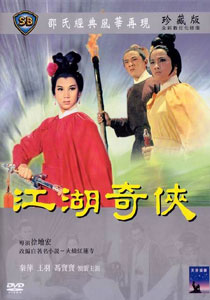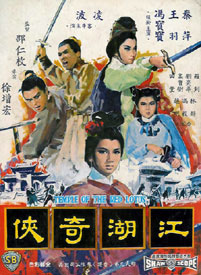 Jimmy Wang Yu, who would later become internationally known for his role as the one-armed swordsman, in his debut film played Gui Wu of Ming House. An uncle trained Gui Wu for ten years in martial skills. Now it is his mission to avenge his parents. Jimmy Wang Yu, who would later become internationally known for his role as the one-armed swordsman, in his debut film played Gui Wu of Ming House. An uncle trained Gui Wu for ten years in martial skills. Now it is his mission to avenge his parents.
He was a child when his family was massacred, but he has managed to remain a naive, sweet, wandering swordsman. He feels it is a privilege to have encountered the Lady in Red (Ivy Ling Po), a great swordswoman, who saved his life along the road.
Temple of the Red Lotus (Jiang hu ji xia, 1965) is a minor classic of wuxia, first of a trilogy, to be followed by The Twin Swords (Huo shao hong lian si zhi yuan yang jian xia, 1965) & The Sword & the Lute (Huo shao hong lian si zhi qin jian en chou, 1967).
Ivy Ling Po is really only a guest star, in the film for a disappointingly short time. The leading lady is played by Ching Ping, who was also in The Twelve Golden Medallions (Sap yee gam paai, 1970) & Vengeance is a Golden Blade (Fei yin kam do, 1969).
She did not make a great many films compared to other stars of the time. She retired after only seven years & avoided public appearances thereafter.
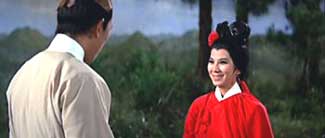 Also in the cast is Fung Bo-Bo (i.e., Petrina Fung), who was a gigantic box office draw in her day, typecast in Chinese equivalents of Shirley Temple roles. Also in the cast is Fung Bo-Bo (i.e., Petrina Fung), who was a gigantic box office draw in her day, typecast in Chinese equivalents of Shirley Temple roles.
In Temple of the Red Lotus Fung Bo-Bo's beginning to be a bit old for it, but still pommelled into child roles.
She plays Shao Ling, or Little Ling, a boyish young girl who can fight, & who guarantees child-appeal for the film.
Gui Wu's last living relations reside in Dragon Valley. They're secretly bandits, led by Gui Wu's grandmother, a beautiful old clan matriarch.
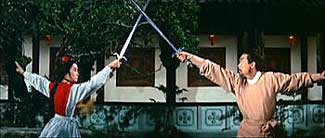 Since he was a toddler he has been betrothed to Lian Zhu (Ching Ping). He hardly knows her, whereas another young man, Du, is already in love with her. Since he was a toddler he has been betrothed to Lian Zhu (Ching Ping). He hardly knows her, whereas another young man, Du, is already in love with her.
Naive Gui Wu rebels against the notion of belonging to a bandit clan. But to earn freedom from family obligation, he must fight his way out of Jin Castle, through the courtyard, & out of the valley, stage by stage.
He wants to take his betrothed with him, as she had never realized her family were all bandits, & is not pleased with the revelation.
Having no family of his own, Gui Wu, along with Lian Zhu, are giving up a lot due to disapproval of banditry, the clan otherwise having made a pretty good extended family.
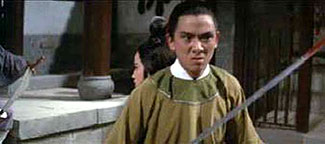 The women of the clan are great fighters who array themselves against Gui Wu. He must first fight his aunt just to get out of the castle. She fails to defeat him only because Lian Zhu's dart-throwing saved him. The women of the clan are great fighters who array themselves against Gui Wu. He must first fight his aunt just to get out of the castle. She fails to defeat him only because Lian Zhu's dart-throwing saved him.
In the next courtyard he fights Lian Zhu's aunt. She defeats Gui Wu, yet she hasn't the heart to stop the couple from continuing to the next level of their escape.
The hardest to get past is bound to be Lian Zhu's Ma & the grandmother matriarch. Ma realizes she can't attack her own daughter or her daughter's beloved, & is only faking the battle, proof that bandits can have great hearts too.
Had the men not been absent that day, Gui Wu & Lian Zhu might not have gotten away, as the men lacked such soft hearts. Even so, on the bridge outside the clan's stronghold, they meet the toughest opponent of all, grandma.
She is well beyond their ability to defeat, but as they take turns begging to be killed if she will spare the other, she gets soft-hearted at last. It's a surprisingly moving farewell sequence.
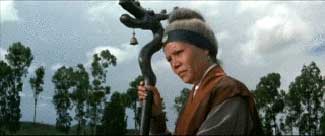 The final attempt of Du to win Lian Zhu for himself is again frought with humanity, which tempers & gives meaning to all the swordplay. The final attempt of Du to win Lian Zhu for himself is again frought with humanity, which tempers & gives meaning to all the swordplay.
Everyone has a streak of chivalry in them, & for a "non stop action wuxia," it all has enough underpinning of character & compassion that the serial duels & battles never flag for interest.
The romance of Lian Zhu & Gui Wu is very well developed, but runs it's course & gets somewhat muddled as the story turns back to Gui Wu's mission of revenge for his parents, assisted by his new bride.
The Red Lotus Clan are rivals of the bandits of Dragon Valley, but Gui Wu does not know either clan's full history. The dragon-dart that nearly killed young Gui Wu is the symbolic weapon of his clan from Dragon Valley.
He'd travelled to meet this family in part to learn the dart technique of Dragon Jin, his uncle. Fortunately Lian Zhu also knows this art, so Gui Wu can still learn it.
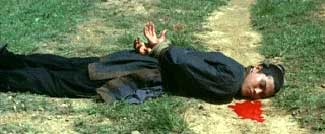 The parallel symbolic weapon of the rival clan is the Red Lotus Dart, which look like little red flowers. The parallel symbolic weapon of the rival clan is the Red Lotus Dart, which look like little red flowers.
Red Lotus Clan turns out to be so shitty & evil it's all too obvious Gui Wu will eventually find out they're connected to his parents' deaths.
Though the Lady in Red seems part of this clan by her color coordination, she's actually an independent warrior who keeps her distance, & Gui Wu won't have to make any hard choices about her.
At first Gui Wu & his bride innocently seek shelter in Red Lotus Temple, not knowing the monks regularly kidnap beautiful girls. When battles inevitably erupt, these lacked as strong a human element as the series of fights staged in Dragon Valley.
 This new batch of encounters wouldn't've held my attention at all except that Ching Ping as Lian Zhu is such a lovely swordswoman. This new batch of encounters wouldn't've held my attention at all except that Ching Ping as Lian Zhu is such a lovely swordswoman.
However, to tell the truth, even she cannot give a lot of power to the workmanlike choreography.
Having learned the silly moral lesson that there are good bandits & bad bandits, the couple return to Jin Castle in Dragon Valley after defeating the mean & nasty Lotus Clan, with only scant help from the mysterious & protective Lady Red.
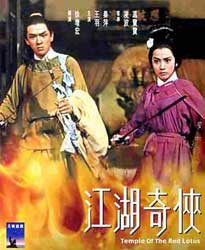 Gui Wu never finds out who specifically killed his parents, leaving this meandering tale feeling like what it is, Part I. Gui Wu never finds out who specifically killed his parents, leaving this meandering tale feeling like what it is, Part I.
I liked this film but it must be admitted that the plot is a mess & the all-important fight choreography merely so-so.
It was nevertheless a box office smash, & was so imitated thereafter that this film could be argued to be a marker for the decline of quality historicals into nonstop fight films with needlessly convoluted stories barely holding it all together.
The love story was better done thus more exciting than the martial arts, which were wholly generic.
The revenge storyline was tepid, & the notion that there are "good" bandits who kill everyone just like "bad" bandits makes it all morally suspicious for all its pretentions of chivalry. And the character of the Lady Red is so little seen she should've been named Red Herring.
There are nevertheless many saving graces, especially the presence of Ching Ping as the swordswoman, besides a pleasing support cast where familiar faces like Lo Lieh & Helen Ma (in her first film) are continously passing through these elegantly pictorial landscapes. And the film's historical significance to the development of wuxia is unmistakable.
copyright © by Paghat the Ratgirl
|
